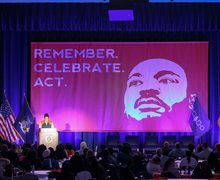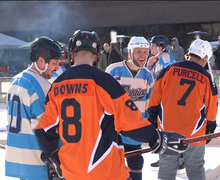Beckman: Social media steals show at 2014 Olympics
The 2014 Winter Olympics didn’t begin with the traditional lighting of the Olympic flame. It started with #SochiProblems.
When thousands of reporters arrived in Sochi a week and a half ago, they found hotels under construction, contaminated water and broken plumbing — so they tweeted about it.
#SochiProblems was tweeted 26,000 times within 24 hours of the reporters’ arrivals and numerous Twitter accounts like @SochiFails and @SochiProblems popped up overnight, BuzzFeed reported on Feb. 6.
There is a lot of social media attention surrounding these games, but its focus is not on the incredible journeys and accomplishments of the athletes. Rather, it’s on the drama and all the things wrong with this year’s competition. And Millennials are the ones creating the headlines.
Let the games begin.
For this year’s Olympics, the Internet is the toughest critic, and the Internet is not impressed. During the opening ceremony, one of the iconic Olympic rings didn’t light up. A picture of the mishap quickly went viral around the web.
I, like many others, didn’t watch the opening ceremony, so my only knowledge of it came from seeing that picture countless times on my Twitter feed. The fail took the attention away from the actual event.
Sochi’s mistakes weren’t the only thing distracting from the actual sporting events. Broadcaster Bob Costas’ pink eye went viral — literally and figuratively — quickly becoming one of the top news stories during the first few days of the Olympics. I heard more about Costas’ eye than I did about the Olympic sports.
American bobsledder Johnny Quinn was trapped in his bathroom and broke through the jammed door to get out. The picture of the smashed door tweeted by Quinn quickly went viral, only adding to the list of #SochiProblems.
Though there has been a lot of attention toward non-sporting events, there have also been a few standout Olympic performances that have gone viral. Julia Lipnitskaia, a 15-year-old Russian figure skater, became one of the most talked about athletes during the games after her gold-medal-winning performance left audiences amazed. A video of her performance is making rounds on the web, and news sources and social media are buzzing about her talent.
After scoring the game-winning goal in a shootout against Russia’s hockey team, T.J. Oshie quickly became a household name on social media, receiving a huge increase in followers and mentions on Twitter.
That being said, Lipnitskaia and Oshie are only two of thousands of athletes who have trained their whole lives to compete in the Olympics. The lack of attention toward the majority of athletes reveals how one-sided social media can be.
#SochiProblems and relevant viral videos don’t do anything except turn an international event into a joke. The negative things that trend on social media detracts from the whole point of the Olympics: the events and the athletes who compete in them.
Neither the Olympics nor social media is going away. It’s literally in everyone’s hands to decide what goes viral and what’s better left untweeted. Hopefully, the next Olympics we will focus more on the events of the games, rather than on pink eye and a less-than-stellar opening ceremony.
Kate Beckman is a freshman magazine journalism major. Her column appears weekly. She can be reached at kebeckma@syr.edu and followed on Twitter at @Kate_Beckman.
Published on February 18, 2014 at 1:47 am





